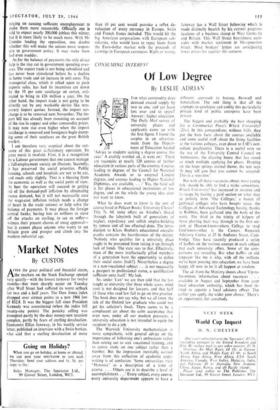Of Low Degree
CONSUMING INTEREST
ADRIAN By LESLIE
What he does want to know is the sort of course listed in Pelican Books' University Choice? This 7s. 6d. tome offers an Ariadne's thread through the labyrinth built of generations of neglect, expediency and selfish empire-building by remote and all too effectual dons. The intro- duction to Klaus Boehm's educational encyclo- paedia contains the heartlessness of the matter. 'Nobody who qualifies for a university place ought to be prevented from taking it up through lack of funds. The state sees to that. Effectively, most of the more intellectually gifted members of a generation have the opportunity to define their social status [huh?]. Nevertheless a degree in a non-vocational subject ... is not necessarily a passport to professional status, a qualification sufficient unto itself.' My huh.
So, under 'Law' we are then told that the law taught at university (for three whole years, mind you) is not designed for lawyers, and that half of those who read law fail to go on into practice. The book does not say why, but we all know the tale of the Oxford law graduate who could not get his solicitor's finals. There seems to be a complacent air about the calm acceptance that even now, under all our modern pressures, a university education is not intended to equip the recipient to do a job.
The Warwick University mathematician is more sympathetic, with general advice on the importance of following one's enthusiasm rather than setting out to seek vocational training, and to centre study on one subject rather than a number. But the impression inevitably carried away from this collection of academic copy- writing is of confusion. 'Some universities treat "Honours" as a description of a kind of course. . . . Others use it to describe a level of accomplishment. . . .' Every subject, every course, every university department appears to have a different approach to botany, Beowulf and bimetallism. The odd thing is that all the
attempts to catalogue and codify this particularly private kind of public enterprise have been private.
The biggest and probably the best shopping list is Cornmarket Press's Which University? (21 s.). In this compendium, without frills, they
put the bare facts about the courses available and some useful stuff about the living facilities at the various colleges, even down to LSE's con:
sultant psychiatrist. There is a useful note on the use of the University Central Council on Admissions, the clearing house that has saved so much multiple applying for places. Harping on the hope springs eternal theme, the text says 'It may tell you that you cannot be accepted. This is a rejection.'
But with all those vacancies about, most young folk should be able to find a niche somewhere.
Which University? has increased its revenue and
its scope by having a paid section on what they so politely term 'The Colleges,' a bunch of technical colleges who have bought space, the Colleges of Advanced Technology having, thanks to Robbins, been gathered into the body of the work. The third in the trinity of helpers of those plotting their way through to the first ses- sion at Heaven-knows-where College to read God-knows-what is the Careers Research Advisory Centre at 25 St Andrews Street, Cam- bridge. They have recently produced a series of leaflets on the various courses in each subject
that each university offers. Some of the com- parisons are revealing. But what baffles an old
taxpayer like me is why, with all the millions we've been pouring into education, we have been happy till now to let it all happen at random.
The ad. from the Ministry shouts about 'Up-to- the-minute information about vacancies . . .
available in August and September from your local education authority, which has been in- vited to appoint a local advisory officer. The earlier you apply, the wider your choice.' There's an opportunity for somebody.






























 Previous page
Previous page